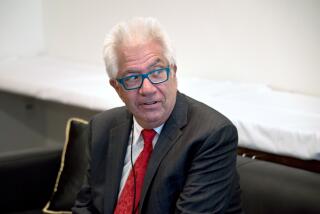Chalmers Johnson, influential scholar of East Asia, dies at 79
- Share via
Chalmers Johnson, an influential scholar of East Asia’s political economy whose seminal writings forced a reevaluation of both the Chinese Revolution and the Japanese “economic miracle,” has died. He was 79.
Johnson, who taught at the Berkeley and San Diego campuses of the University of California from 1962 to 1992, died Saturday of complications of long-term rheumatoid arthritis at his home in Cardiff-by-the-Sea, said his wife, anthropologist Sheila K. Johnson.
The UC Berkeley-educated Johnson was the founder and president of the Japan Policy Research Institute, a 16-year-old nonprofit organization devoted to public education about Japan and its place in the world. It is now housed at the University of San Francisco Center for the Pacific Rim.
“He was in many ways America’s leading scholar on East Asia, and at the end of his career he blossomed as a famous public intellectual,” said Patrick Lloyd Hatcher, the Kiriyama Distinguished Fellow at the USF Center for the Pacific Rim.
A prolific writer, Johnson made his initial impact with the 1962 publication of his dissertation, “Peasant Nationalism and Communist Power,” which offered a revisionist view of the emergence of revolutionary China between 1937 and 1945.
“He argued that famine more than personalities drove the Chinese political settlement,” Hatcher said.
Subsequent to that, Johnson wrote an even more influential book about Japan: “MITI and the Japanese Miracle” (1982), which argued that the government was the major player in the Japanese economy rather than the private sector. (MITI was the Ministry of International Trade and Industry.)
“With this book, Johnson became [known as] ‘the godfather’ of the revisionist school of Japanese political economy,” Hatcher said.
Ken Kopp, associate director of the Center for the Pacific Rim, said that as a writer, a scholar and a teacher, Johnson “not only had an impact in the academic world, but he went on to have a considerable impact in the public sphere.”
He did that, Kopp said, “through his most recent works, which were a so-called empire trilogy on what he saw as the pathologies of America’s current role in the world.”
The three books are “Blowback: The Costs and Consequences of American Empire” (2000), “The Sorrows of Empire: Militarism, Secrecy, and the End of the Republic” (2004) and “Nemesis: The Last Days of the American Republic” (2006).
“What he was trying to do was wake people up to the transition of America from a republic to an empire,” Kopp said. “The book ‘Blowback,’ which is about the unintended consequences of America’s actions within the world, proved to be a runaway bestseller after 9/11 because it was seen as a possible explanation for what had happened.”
In “Nemesis,” Johnson argued that “to maintain our empire abroad requires resources and commitments that will inevitably undercut our domestic democracy and in the end produce a military dictatorship or its civilian equivalent....
“[The] combination of huge standing armies, almost continuous wars, military Keynesianism, and ruinous military expenses have destroyed our republican structure in favor of an imperial presidency. We are on the cusp of losing our democracy for the sake of keeping our empire.”
Born in Phoenix on Aug. 6, 1931, Johnson moved to Alameda, Calif., with his family in 1945. He earned a bachelor’s degree in economics from UC Berkeley in 1953. He then served as a naval officer for two years and began studying Japanese on his own while stationed in Japan.
Returning to UC Berkeley, he earned a master’s degree in political science in 1957 and a doctorate in political science in 1961.
While a faculty member at UC Berkeley from 1962 to 1988, he served as chairman of the political science department and chairman of the Center for Chinese Studies. He also was an unpaid consultant to the CIA’s Office of National Estimates from 1968 to ’77.
In 1988, he joined the School of International Relations and Pacific Studies at UC San Diego. He retired from the university in 1992.
Johnson also was chairman of the academic advisory committee for the PBS series “The Pacific Century” and played a prominent on-camera role in the PBS “ Frontline” documentary “Losing the War with Japan.”
In addition to his wife of 53 years, Johnson is survived by his sister, Barbara Kay Johnson.
A memorial service is pending.
More to Read
Start your day right
Sign up for Essential California for the L.A. Times biggest news, features and recommendations in your inbox six days a week.
You may occasionally receive promotional content from the Los Angeles Times.







